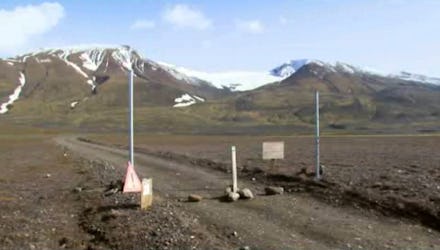A Massive Volcano Is Erupting in Iceland

The Bárðarbunga volcano in central Iceland began erupting on Saturday under a massive glacier, leading authorities to ban air traffic in parts of the country and, according to the BBC, announce a "red-alert" — the highest warning on the country's five-point scale — indicating "significant emission of ash into the atmosphere." As of now, the eruption has remained relatively small, but experts are watching closely to make sure it doesn't turn into a major international incident like Eyjafjallajokull's eruption in 2010.
Bárðarbunga started getting ready to blow a few days ago when seismologists detected about 3,000 little earthquakes in the area, a sign of moving magma, according to Vox. The eruption came today, though it's currently going down underneath the volcano's glacial covering.
The background: Bárðarbunga is the second-highest peak in Iceland. Luckily for air travelers, there are 150 to 400 meters of ice covering up the eruption site. The blast has yet to break through the ice, which has kept it from having the massive effect of Eyjafjallajökull.
But that could change. "The eruption is considered a minor event at this point," Icelandic police said in a statement. "Because of pressure from the glacier cap it is uncertain whether the eruption will stay sub-glacial or not."
And if it doesn't? "There's nothing we can do if we get another big eruption. .. except to interrupt air traffic in the dangerous areas," Icelandic Civil Aviation Administration spokesman Fridthor Eydal said a few days ago.
Previous eruptions: If you remember one Icelandic volcano eruption, you probably remember Eyjafjallajokull. The ash that was shot into the air sidelined flights for six days, stranding more than 8 million travelers. It was the world's largest airspace shutdown since World War II, according to Agence France-Presse. A year later, Grimsvotn volcano erupted, causing a few more days of interrupted air travel. Grimsvotn is the country's most active volcano.
Even if the current eruption does break through the ice, things likely won't be as bad as they were four years ago. As Vox notes, the ash requirements for grounding a flight have been raised, allowing more plane travel in the event of an eruption.
So if you've got a flight to Europe in the next few days, you'll probably be fine. But keep an eye on things just in case.